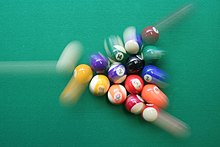15 ball
15-ball (also 61-pool) is a discipline of pool billiards in which the fifteen object balls (the colored ones) and one game ball (the white ones) are played on a pool table.
Historical
This discipline is best known in the USA, where it has been played in national championships since the early 1880s. One of the big stars of the scene at that time was the Cuban Alfredo de Oro , who won the title in 1887 and 1888.
General
15-Ball is a game in which players play for points and mistakes (scratches) make a dramatic turn at the table. The game is also sometimes called the 61-pool. This is the number of points needed to win the game. The sum of the numbers 1–15 on the balls add up to 120. In contrast to rotation, a similar pool table variant, the shot changes after each shot by a player. Experienced players cannot achieve a series and the game remains balanced. The attraction of the game is to achieve more points through more difficult hits such as board hits, combinations or bow balls.
regulate
Structure and impetus
All 15 object balls are set up together as in the 8-ball , with the 15 on the foot point. In contrast to 8-Ball, it does not matter how the numbers or whole / halves are configured in the triangle. The 15 at the top of the triangle ensures that it does not fall when it hits. Sometimes, however, the players build the high balls in front and the low balls in back, as these will first come loose and then be playable. This is especially true for inexperienced kick-off players. It is a valid kick-off if at least two object balls and the game ball (white) have touched a board.
Style of play
It is played one on one, which means: after each stroke the player gives up and it is his opponent's turn. The balls do not have to be announced and they do not have to be played in order (see rotation ). The player has free ball choice, but must hit at least one ball regularly. Then the player change takes place. The points scored are now credited to the player or deducted after a foul. The first player to score 61 wins the game. In the event of a tie with the last sunk ball, the current player receives an extra tie-break point.
Fouls
A foul occurs if ...
- ... the ball is sunk
- ... a ball leaves the table
- ... a penetration is carried out (with balls lying close together, when the cue hits the cue ball twice in the direction of impact)
- ... the player touches balls with his clothing
- ... the cue touches or even moves one of the other balls when it hits
All balls sunk during the foul come back on the table and, starting at the foot point, are placed one behind the other towards the foot board without moving those lying on the table. In addition, three points are deducted from the player. In the event of a foul (scratch) or if the cue ball has left the table, the opponent has "ball in hand", that is, free choice of placing the ball, with play in any direction. There is no three-foul penalty (loss of game).
Individual evidence
- ↑ a b c d e Ana Purna: 15-Ball Rules. eHow.com, archived from the original on November 25, 2016 ; accessed on November 25, 2016 .
- ↑ Rotation rules. BillardBlog.info, archived from the original on November 25, 2016 ; Retrieved November 25, 2016 .
- ↑ a b c 15-Ball Rules. Virtual Pool Online, archived from the original on November 25, 2016 ; accessed on November 25, 2016 .
